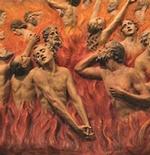Make your gift today!
Help keep Catholics around the world educated and informed.
Already donated? Log in to stop seeing these donation pop-ups.
Catholic Dictionary
Find accurate definitions of over 5,000 Catholic terms and phrases (including abbreviations). Based on Fr. John Hardon's Modern Catholic Dictionary, © Eternal Life. Used with permission.
Random Term from the Dictionary:
FUNDAMENTAL OPTION
A theory of morals that each person gradually develops in a basic orientation of his or her life, either for or against God. This fundamental direction is said to be for God if one's life is fundamentally devoted to the love and service of others, and against God if one's life is essentially devoted to self-love and self-service.
As such, the idea of a fundamental option is not new. It was reflected in St. Augustine's teaching that the human race is ultimately composed of two cities: the City of God, whose members love God even to the contempt of self, and the City of Man, whose members love themselves even to the contempt of God.
What is new is the use of this idea to explain mortal sin. In 1975 the Holy See issued a formal declaration, Persona Humana, in which certain theories involving the fundamental option were condemned. "There are those," the document stated, "who go so far as to affirm that mortal sin, which causes separation from God, only exists in the formal refusal directly opposed to God's call, or in that selfishness which completely and deliberately closes itself to the love of neighbor. They say that it is only then, that there comes into play the 'fundamental option', that is to say, the decision which totally commits the person and which is necessary if mortal sin is to exist."
The Holy See admitted the description of a person's basic moral disposition as a "fundamental option." What is not admissible is to claim that individual human actions cannot radically change this fundamental option. A person's moral disposition "can be completely changed by particular acts, especially when as often happens, these have been prepared for by previous more superficial acts. Whatever the case, it is wrong to say that particular acts are not enough to constitute a mortal sin" (Persona Humana, Congregation for the Doctrine of the Faith, December 29, 1975, number 10).
Implicit in the proscribed theory is the notion that there can be serious sins, such as murder or adultery, because the actions are gravely wrong. But no mortal sins, with the loss of sanctifying grace, is committed unless a person subjectively rejects God. This would subvert the whole moral order of Christianity, which believes that the essence of mortal sin is the deliberate choice of some creature which is known to be gravely forbidden by God.






